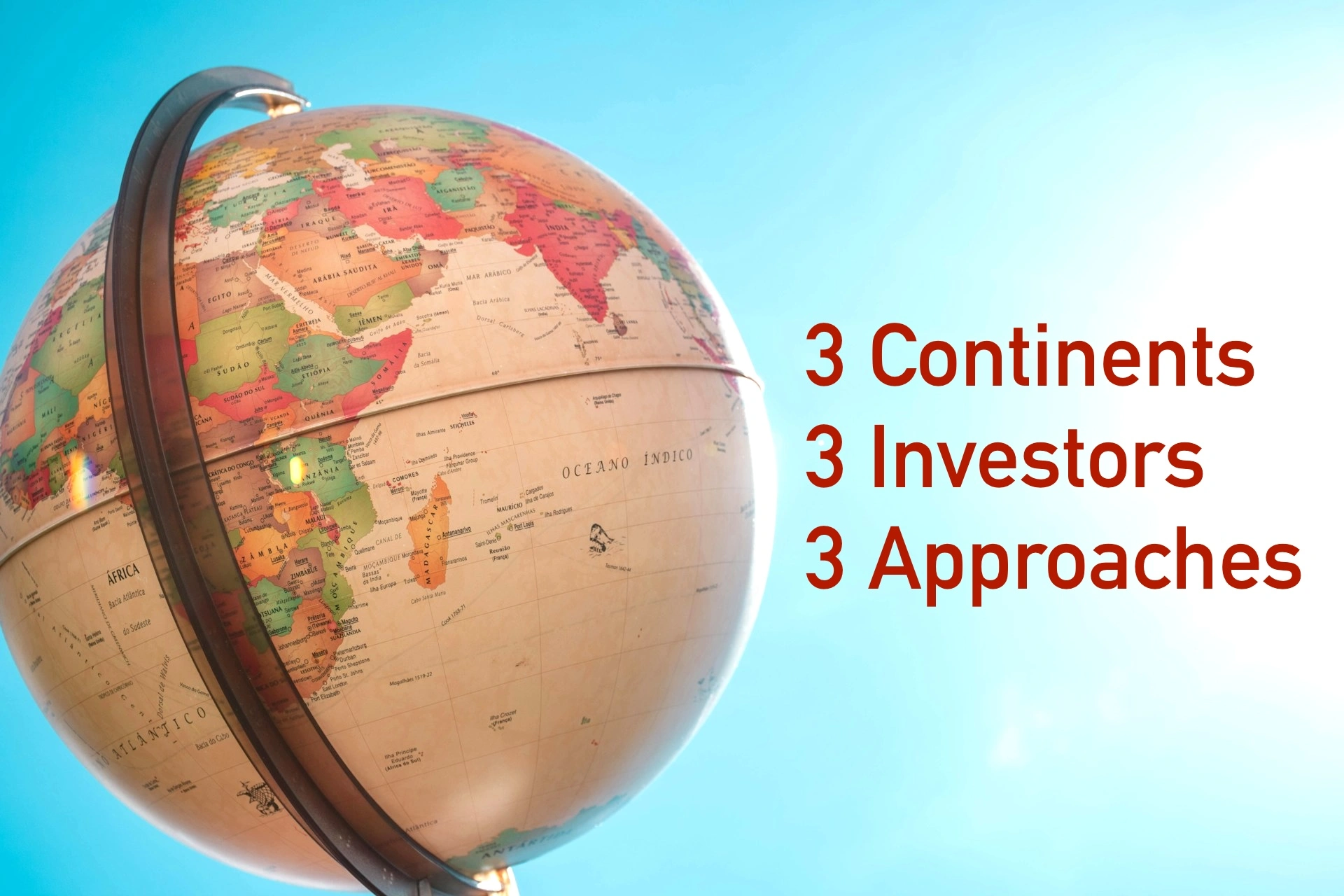When it comes to social media, you’ll find Mrs Wow (aka Lynn) buzzing around 𝕏 more than anywhere else. It’s her go-to spot to meet and hang out with fellow finance enthusiasts.
Although I’m not on 𝕏 myself, Mrs Wow always keeps me up to date with all the latest happenings, including the cool people she meets. Recently, she introduced me to two of them, who were kind enough to share their investment wisdom with us.
This article is presented in the style of an interview, with me asking the same questions to:
Since the three of them hail from different corners of the world, it’ll be fascinating to learn about their varied approaches to investing and building their portfolios.
- Please tell us a little about yourself.
- How long have you been investing? Would you consider yourself a passive or an active investor, or a mix of both?
- Do you invest in other markets besides the US? Why or why not?
- What is one fund or stock you do not see yourself selling in the next 10 years?
- Do you invest in gold and silver? Why or why not?
- Do you invest in cryptocurrencies then?
- What is one piece of advice you will give to someone who wants to start investing?
Q1: Please tell us a little about yourself.

Hello everyone! My name is JJ. I’m in my mid-30s and married to my amazing wife. I have an MBA and a CPA, and have been working full-time in corporate finance for over 15 years.
I have a side gig — JJs FinClub — which maintains an online presence through platforms like 𝕏, blogs, and newsletters. I’m also in the process of establishing my own coaching business.

Hi, my name is Rafael Biacotti and I’m a 33-year-old IT Project Manager. I was born and raised in Lisbon, Portugal, but I have been living in London, UK since last spring.
I’m happily married to my partner in crime and we currently have no kids. I am passionate about personal finance, investing and looking out for new strategies to achieve financial freedom.
During my free time, I enjoy reading, travelling, exercising and often exploring new places in the UK and around the world.

Hi everyone! I’m Lynn, a personal finance blogger from Singapore, cruising through my 40s and soon to be 47. Mr Wow and I have been married for 23 years. Just us two, no mini-me’s running around.
We retired from our business in 2020, just before the pandemic turned the world upside down. Talk about timing, right? Instead of peace and tranquility, we stepped right into chaos!
Sure, it was a real blessing that we didn’t have to stress about overheads during the lockdown (tough times for small business owners then), but watching our portfolio take a rollercoaster ride was no joke. Thankfully, we survived the test and that greatly boosted our confidence as investors and early retirees.
Check out: Investing During a Recession: What You Need to Know
Q2: How long have you been investing? Would you consider yourself a passive or an active investor, or a mix of both?

My investing journey began around 14-15 years ago, but in the initial years, my dad was the one who managed my investments and I had no idea what he was doing!
Of course, we learn about investing in finance courses at school, but translating that knowledge to real-life situations is a different matter. I was very lucky that my dad was also into investing and was there to guide me through those early years.
I started to become more involved in investing about 11-12 years ago. Like many who think it’s a get-rich-quick scheme, I became more of an active investor.
After a few stressful months and losing almost 40% of my portfolio, I realized I was wrong and reverted to a more passive investing style. Now, I rebalance my portfolio from time to time and try to find good value investments.

I started investing back in 2018, although admittedly I did not know exactly what I was doing at that time. Having an extensive background in software and technology, it’s no wonder that my first interest was in the crypto space.
After a few bumps on the road, during the pandemic, I realized that I lacked sound investing knowledge. So I started reading up fervently on anything to do with money, investing and achieving financial independence.
After much research, I was inclined towards passive investing and now consistently contribute my monthly “pay-yourself-first money” into two ETFs: $VHYL (an all-world index ETF) and $VUSA (an S&P 500 ETF). These are kept in my ISA (Investing Savings Account), a tax-free account with a considerable yearly allowance in the UK.
Whilst I’m more of a passive investor, I do hold riskier assets such as individual stocks like $SAP (a software company) and $O (a REIT), as well as $QDVE (a US IT-focused ETF). I also own a few cryptocurrencies — mainly Bitcoin and Ethereum — the “big dogs” in the crypto market.

I didn’t start investing until my mid-30s, so I’ve only been at it for 12 years. Mr Wow and I mix things up with a blend of passive and active investing, but we definitely lean towards the passive side. Our portfolio is predominantly made up of ETFs, REITs and stocks that we intend to hold long-term, but we do have an exit plan for certain stocks.
So for these stocks, we usually take some profits when they hit our target prices (if the reasons still make sense), letting the rest ride for potential further upside. This approach helps to manage risk by avoiding overexposure in our portfolio.
It’s worth noting that as life evolves, so will your portfolio. As retirees, preserving our wealth takes precedence. This involves prioritising sustained prosperity over high-risk growth. That’s why we’ve divided our funds into three retirement buckets, which include a liquid component and defensive assets.
Check out: The Importance of Liquidity in Personal Finance & Investing
Q3: Do you invest in other markets besides the US? Why or why not?

I invest primarily in the US market and also hold some Canadian stocks. I bought a few ETFs a while back that gave broader geographic exposure, but I haven’t added to them in recent years.
I used to own more Chinese stocks but have very few left now. Due to the US-China relationship, I reduced my exposure there.
My favorite investor, Warren Buffett, frequently mentions his optimistic outlook for the US economy, expressing confidence that it will continue to improve — and I agree. That is why I’ve focused the majority of my portfolio on the US stock market, which I believe offers substantial growth potential.

My biggest portfolio allocation is invested toward one individual stock, $SAP, which is a German-based company. This is because I worked in that company for almost 10 years and was blessed with the option of a vesting scheme allowance. It granted me the opportunity to buy shares monthly at a premium discount.
Additionally, I hold $VHYL, which includes a big chunk (53.5%) of international companies outside of North America.
Although I’m a big believer in US growth for the next few decades, I invest beyond the US market to essentially diversify my portfolio. Put it this way: I like to have my eggs in different baskets.

Yes, we’ve spread our investments across three markets: Singapore, China and the US. China is a very small slice of the pie at just 7%. We believe geographical diversification is essential for reducing overall risk and creating opportunities for growth.
For both the US and China, our investments are mainly in the form of ETFs. We also hold two global ETFs: $VHYD and $VWRD. $VHYD is similar to $VHYL, which Rafael owns, but the fund currency is in USD rather than GBP.
Since we’re based in Singapore, it made sense to kick off our investment journey here. Some folks say the Singapore market is too small and not exciting enough, but we’re not in it for the excitement, ha! We appreciate the benefits of investing here. The economy is solid and it’s easy to access reliable information. Plus, the tax-friendly setup is a big win — no taxes on dividends and capital gains, so we get to keep all our earnings. There’s also no inheritance tax, which is great for those planning for their heirs.
I think there’s a fine distinction between home bias and home advantage, which all investors, regardless of their location, should examine and decide for themselves.
Check out: Beyond Borders: Why Invest in a Global Index Fund
Q4: What is one fund or stock you do not see yourself selling in the next 10 years?

I think from a stock perspective, it will be $GOOG. It’s hard to imagine life without Google, given its integral role in technology and daily life. As the world continues to innovate, I expect the company to remain a key player over the next decade, continuing to grow alongside those innovations.
A fund or ETF I plan to keep holding is $SPY. This ETF, which tracks the S&P 500, is a reflection of the broader US market. Similar to my previous point, I believe that in the next 10 years, both the US economy and the US stock market will be higher than they are today, making it an easy way to grow your investments.

I like to think I won’t be selling any of my stocks in the near future. However, if I had to choose one asset to lock away from the selling temptations, I would probably pick $VUSA.
The US stock market has shown many times in the past that if there is an environment capable of thriving, it’s within American borders, with American technology and the mindset of the people.
In my opinion, the potential growth from $VUSA is likely bigger than any other asset I currently own. Historically, it has shown consecutive gains over the years (~10% without discounting for inflation), and that to me promises very healthy returns on investment in the next 10 years.

Gosh, it’s tough to pick just one! As much as I like my Singapore bank stocks and $VUSD (same fund as $VUSA but denominated in USD), I’m going to go with $VHYD. We added this ETF late in 2020 when the market was recovering from the COVID crash, so the allocation isn’t large.
Here’s the back story. Before we officially retired, we structured our portfolio in such a way that we would draw down only 3% of its total value annually. In reality, our withdrawal rate was lower than that as our dividends and coupons not only covered our expenses but also left us with extra cash (note: dividends and coupons should be considered part of the annual withdrawal). Pretty awesome, right?
But… Covid-19 struck just one month into our retirement and I would be lying if I say we weren’t even remotely concerned. To enhance stability, we decided to add a global high dividend yield ETF to our portfolio. So far, we’re satisfied with the returns and intend to put more funds into it.
Check out: Why We Love Dividend Investing but It’s Not For Everyone
Q5: Do you invest in gold and silver? Why or why not?

I owned gold for a brief period about four years ago, but I no longer hold any gold or silver. I think there’s a time and place to own gold, but it shouldn’t be a part of a regular portfolio if you’re on the younger side.
I invested in gold previously as I anticipated a price increase. I was right and made a return of about 50-60%. Gold has delivered solid returns in the past few months amid persistent inflation, but I’m not sure how long this trend will last.

I currently don’t and have my reasons for this.
First and foremost, I’m in the compounding stage of my investing journey. This means I’m mostly looking to leverage my investment portfolio using riskier assets, such as stocks, ETFs and cryptocurrencies.
Based on historical performance, this should work out well for the long term, especially since I plan to continue investing for at least the next 30 years. It just makes more sense to me at this stage.
Commodities and other relatively stable assets will likely become part of my portfolio down the road. I’m planning to add them slowly over time to balance out riskier assets and create a more diversified portfolio.

We used to own physical gold and silver, which we purchased in 2014 and 2015. However, we offloaded 80% of our gold and all of our silver in 2020 and 2021 when prices were high. We thought we would be holding the remaining 20% of our gold for a while, but when prices surged again in 2022 due to the Russia-Ukraine war, we decided to sell everything. So now, we don’t hold any precious metals.
You could say that we were bitten by the precious metal bug, which led us to invest a significant sum in gold and silver. Although we made a decent profit (total annualised return of 7.3%; gold did better than silver), in hindsight, it wasn’t the most effective strategy. Our money could have been put to better use in productive assets that grow and generate income.
While gold has a reputation for being a safe-haven asset during uncertain times and a hedge against inflation, we believe our portfolio has a strong enough defence to weather heavy storms. Our returns have also consistently outpaced inflation.
Frankly, gold is a long-term play. If you plan to buy gold and then sell it for a tidy profit, keep in mind prices can be volatile, particularly in the short term. You might end up waiting for catastrophic events like global recessions, political turmoil, social unrest, wars or pandemics to cash in. Not my cup of tea, but everyone is different.
Q6: Do you invest in cryptocurrencies then?

I own Bitcoin in the shape of ETFs. Buying through ETFs is a great way to add crypto to your portfolio. I made a few posts about it on 𝕏 too.
I used to be on the fence about owning Bitcoin, so I only maintained a small position. But once the ETF was approved, it became a no-brainer for me to start investing more in Bitcoin.
So far, it has paid off and with more countries following suit, I expect its strong performance to continue.

As mentioned before, I do own cryptocurrencies. Most of my crypto portfolio is held in Bitcoin and Ethereum. I also own tokens such as Cardano, Solana, Polkadot, USDT, Nexo and Raydium. I still have a few others but with very little and irrelevant allocations.
I truly believe that blockchain technology coupled with certain principles such as tokenization of assets, decentralization of governance and the empowerment of network contribution (to ensure security), will become a very big player in the investing market.
At the end of the day, we can’t deny that we are living in a digital era where innovation plays a vital role in steering investors into the future.

I think it shouldn’t come as a surprise that out of the three of us, I’m the only one who doesn’t invest in cryptocurrencies. Sure, they can offer huge returns but that also makes them highly volatile. As mentioned, we prefer assets that have the ability to appreciate in value and generate cash flow at the same time.
I hope I’m not offending anyone by saying this. I know many people see bitcoin as digital gold — a store of value due to its finite supply. However, if we wanted a solid store of value, we would have held on to our gold, which has a much longer history of stability.
That said, never say never. As investors, we always keep an open mind. If we decide to diversify into cryptocurrencies in the future, we’ll probably go with a spot bitcoin ETF. But for now, there’s no rush to make that move.
Q7: What is one piece of advice you will give to someone who wants to start investing?

Many people are afraid of investing, while others turn to day trading stocks as a form of investment. My advice to both groups is to first understand what you are investing in before putting your money into it.
For me, the easiest thing to understand is the US economy — is it going up or down? This is where you should start if you are a beginner to investment. It should be simple enough for you to understand and a broad index fund or ETF can provide you with that exposure.

Invest in yourself first! Read. And I mean, a lot! Don’t ever cut out this step.
The internet is full of good and free information nowadays. There are dozens of free YouTube channels empowering you to become equipped with more financial knowledge. Plenty of blogs — I recommend WowPursuits.com! (Mrs Wow: Aww… thanks, Rafael!)
Start with the basics first. What’s truly an asset. How to budget. Understand debt. Understand the compounding effect. Understand interest and how it works great with assets, but can be deadly with liabilities.
Even if your school didn’t teach this (very few schools do), there’s no excuse for not knowing how to make better use of your money and how to build a better future for yourself and your family.

Hmm… I’ll quote Ben Graham: “The individual investor should act consistently as an investor and not as a speculator.” Too many folks think they’re investing when they’re really just chasing after hot tips or trying to get rich quick by making risky bets.
Wealth accumulation requires you to take a long-term perspective and stick to sound strategies that align with your financial goals and risk profile. It takes a great deal of discipline, patience and emotional control to stay the course. Keep your eye on the prize and don’t let every headline or market swing throw you off your game!
Some people naturally possess the right temperament for investing. If you aren’t one of them, the good news is it can be cultivated. Start by doing your homework: read and study the different types of investments. You’ll find that the more you learn, the more confident you’ll become in your investment decisions. Best of luck!
Check out: Tame Your Emotions: Let Your Wealth Compound Uninterrupted
Wow, it’s been a real treat diving into the diverse perspectives these three individuals bring to investing and portfolio management. Clearly, there’s no such thing as a typical investor. Investing behaviours differ from person to person, depending on a multitude of factors such as one’s risk tolerance, time horizon, investment phase and even geographic location.
I hope you’ve enjoyed their insights as much as I have! Huge thanks to JJ and Rafael for generously sharing their experience. It’s been an absolute privilege, and Mrs Wow and I wish them all the best in their wealth building journey.
A CPA with 15+ years of experience managing money, JJ is on a mission to empower you with financial knowledge. Follow him on 𝕏 (@JJsFinclub) to learn more about reducing debt, saving and investing for financial freedom.
Rafael (aka Shield Investor) believes that money should not be a difficult conversation topic. He writes about his personal investing journey in his monthly newsletter. Join him in the pursuit of financial freedom by following him on 𝕏 (@ShieldInvestor).
Mrs Wow (aka Lynn) became debt-free in 2018, achieved financial independence in 2019, and retired in 2020 at the age of 42. She believes in staying invested even if there’s a level-5 shit storm. A homebody, she spends her free time reading, blogging and listening to music. Follow her on 𝕏 (@wowpursuits).
You may also like: The Big Reveal: Our Net Worth Exposed | Why Index Funds are Perfect for Do-Nothing Investors | Dividend Investing Ideas: The Dogs of the Dow Strategy


Nice article! Besides investments in the US market, it was helpful to hear how each of you have varying approaches to ex-US markets and alternative asset classes (e.g., precious metals, crypto) and the context driving each of your decisions.
It made me think of whether I need a bit more diversification into ex-US markets and alternative asset classes. I currently have my entire investment portfolio in US stocks & bonds, physical real estate and private equity.
Thanks, Rob! 😊 I’m glad the article has given you some food for thought.
You’ve done really well for yourself and I think your portfolio is well-diversified across a range of asset classes.
For us, we’re more concentrated on equities and bonds, so geographical diversification helps to reduce country-specific risks and increase portfolio stability. Plus, we’re just a fish in a small pond, so diversifying across different regions (in particular the US) allows us to take advantage of global opportunities.